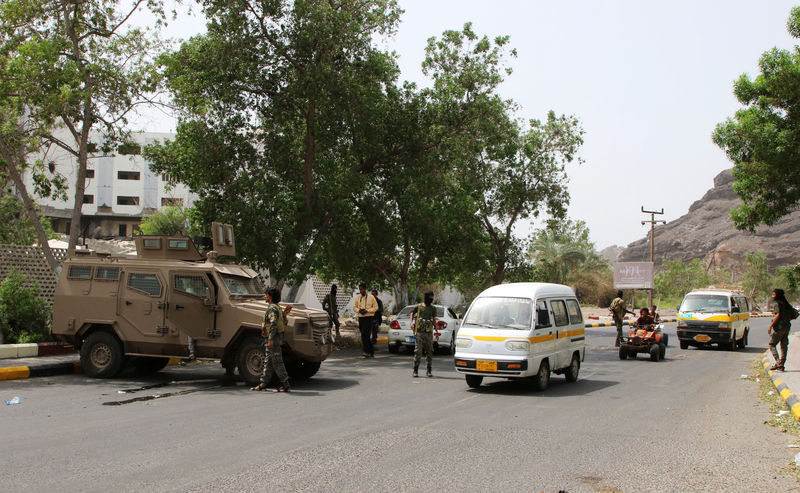By Mohammed Mukhashef and Fawaz Salman
ADEN (Reuters) - Saudi Arabia threw its weight behind Yemen's exiled president on Monday, as United Arab Emirates-backed southern separatists controlling the port of Aden held firm against Riyadh's calls to vacate government sites.
A Saudi-led military coalition has vowed further attacks to dislodge the southern fighters from government military bases, after hitting a separatist area on Sunday as Saudi leaders met with Yemeni President Abd-Rabbu Mansour Hadi in Mecca.
The Western-backed, Sunni Muslim coalition has fractured after more than four years fighting on behalf of Hadi's ousted government against the Iran-aligned Houthi movement that controls the capital Sanaa and most populous areas.
The UAE played down its rift with Riyadh on Monday but did not directly ask the separatist fighters, which it has armed and trained, to cede back control of Aden, the temporary seat of Yemen's government. Hadi is based in Saudi Arabia.
The UAE, Saudi Arabia's main military ally on the ground for most of the war, has drawn down forces since June.
Saudi Arabia and UAE rulers met in Mecca on Monday, in an apparent effort to stop further damage to their alliance that would boost their common enemy, the Houthis, and their regional rival Shi'ite Muslim Iran.
Abu Dhabi Crown Prince Sheikh Mohammed bin Zayed al-Nahyan voiced continued solidarity with Saudi Arabia in Yemen and called for talks between Aden's warring parties.
"The UAE and Saudi Arabia call on conflicting Yemeni parties to prioritise dialogue and reason for the interest of Yemen," state news agency WAM quoted him as saying after meeting Saudi King Salman bin Abdelaziz and Crown Prince Mohammed bin Salman.
The separatist chief, Southern (NYSE:SO) Transitional Council president Aidaroos al-Zubaidi, said his group still supports the coalition against the Houthis and would attend a proposed emergency summit in Saudi Arabia.
But he did not commit to withdrawing forces from the government buildings they seized on Saturday after clashes that killed 40 people, including civilians.
CALM RETURNS
Residents said on Monday the fighting in Aden had ended.
"It is quiet now but people are still worried. We don't know where matters are heading," Aden resident Adel Mohammed told Reuters. He said power and water supplies had been restored, but could be disrupted again.
Local media quoted an official at Aden's airport as saying flights had resumed on Sunday.
Zubaidi said the separatists, who want an independent south Yemen, had no choice but to seize Aden following a deadly Houthi missile strike on southern forces earlier this month.
The separatists accuse a party allied to Hadi of being complicit in that strike, which it denies.
"We were left with two options: defend ourselves or surrender to the eradication of our just cause and souls," Zubaidi said in a statement from Aden late on Sunday.
The rift in the coalition complicates U.N. efforts to implement a stalled peace deal in the main port city of Hodeidah ahead of broader talks to end a war that has killed tens of thousands of people and pushed Yemen to the brink of famine.
The UAE has trained thousands of southern fighters who answer to Zubaidi, a militia leader who emerged from relative obscurity in 2015 after helping to purge the Houthis from Aden.
Violence has escalated in other parts of Yemen after the Houthis stepped up missile and drone attacks on Saudi cities.

The coalition said it attacked Houthi targets in northern Hajjah province on Sunday that the movement's al-Masirah TV said killed 11 civilians. The alliance said it was investigating civilian deaths in the air strikes.